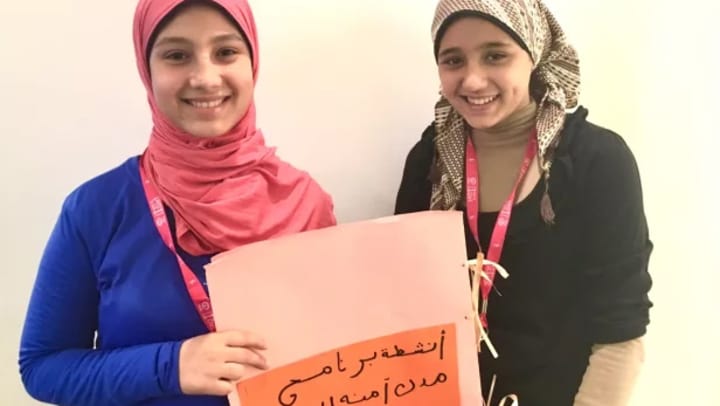
From Bogotá to Bangkok, studies have shown that women and adolescent girls often face sexual harassment and feel unsafe while walking or taking public transport in cities. A 2016 ActionAid survey of women in the U.K., Brazil, India and Thailand found that the vast majority in all countries had experienced street harassment.
In Cairo — one of the most difficult places to be a woman in the Arab world, according to a 2013 poll of gender experts — some teenage girls are finding that concrete changes, such as better street lighting, are coming slowly.
What’s making a difference for two young people — Mariam and Hebatallah, both 13 — is education, and an understanding of what to do when they get harassed walking home from school.
The girls spoke at the recent Commission on the Status of Women forum in New York about a program run by Plan International, which they attend regularly after school.
See more stories on Smart Cities:
► Opinion: Can India’s smart city proposals do more on resilience?
► Opinion: Smart urbanization — 5 fundamental pillars
► Opinion: How can a city be ‘smart’ if it doesn’t include education?
“I’ve learned what harassment means and the principles of girls’ safety. I now know what I should do if I, or any of the girls I know, get exposed to harassment and how to protect myself from it,” said Mariam at the event on safer cities for girls, co-hosted by Plan International, UN-Habitat and the Population Council.
As more and more of the world’s population is expected to live in cities, questions of safety for women and girls like Mariam and Heba will continue to gain importance. By 2030, an estimated 700 million girls will live in cities. Adolescent girls are migrating to cities in greater numbers than boys, a shift that can increase their chances of marrying later and having fewer and healthier children, but also presents new challenges.
Devex spoke with Mariam and Heba on the sidelines of the event. Their surnames have been withheld to protect their identities.
The girls’ awareness of the dynamics of gender-based street harassment is the result of their time with Plan International’s “Safer Cities for Girls” program. Developed with UN-Habitat and Women in Cities International, it operates in five cities, including Hanoi, Delhi, Kampala and Lima, providing training and workshops to about 15,000 adolescent girls.
It takes Heba half an hour to walk to her public school each day; for Mariam, it’s a 45-minute bus ride to her Islamic school. Both have participated in the program for about a year.
“At the very beginning [of the program], I used to have such fear to go alone in the streets. Now I am more confident. I insist on walking to school and do not have fear doing so,” said Heba, speaking through an Arabic translator.
Harassment, while common, is still a taboo subject. In Cairo, 32 percent of adolescent girls said they could not talk to anyone about their safety concerns, according to a Plan International study, which surveyed more than 1,000 young women across five countries. In Kampala, 45 percent of adolescent girls have reported sexual harassment when using public transport, and in Delhi, 96 percent of adolescent girls say they do not feel safe in their city.
“The problem we face is not going to school, but after school, because we have so many [male] youths outside and they start to bother us. After school is the time that all the boys are there,” Heba said.
When taunts come their way, “we just do nothing. We just walk and we make sure we are not having any interference with them [the boys],” she said.
Aside from the confidence boost both girls discussed, there’s also an understanding of the different roles that individual citizens and government representatives play in making cities safe.
“Every stakeholder has a job of defining his own role. In the streets, we are beginning to have more lights. And jobs for young people [are also important], because for men, unemployment increases their presence in the streets and leads to more harassment,” Mariam said.
Mariam and her peers have identified some of the risks on group walks during the program.
“I didn’t recognize before that the lack of street lighting, wild dogs and piles of garbage can be a threat to my safety. By discussing these issues with other girls during the walk, I understood how this poses a serious risk to us. But just identifying the issues wasn’t our ultimate goal. Our aim is to design initiatives that will help us address these issues,” she said.
Mariam said her school provides decent security outside its grounds, compared to the experiences of her friends and siblings at public schools, and that boys can be punished if they harass or harm their female peers. Egypt passed an anti-sexual harassment law in 2014, with a penalty of up to six months in prison. But the measure has been criticized by some groups for its narrow definition of harassment as motivated by the “sexual desires and fulfillment of the offender.”
The girls’ work continues in engaging with their peers and thinking about their future. Mariam wants to be a fashion designer, while Heba would like to become a program director for a development organization.
Over six weeks, Devex and our partners will explore what it takes to build a successful smart city, how climate resilient and environmentally friendly infrastructure and technologies are being implemented, and how actors in the global development community are working together toward common goals and engaging local communities in an inclusive way. Join us as we examine what it takes to create our smart cities of the future by tagging #SmartCities and @Devex.




